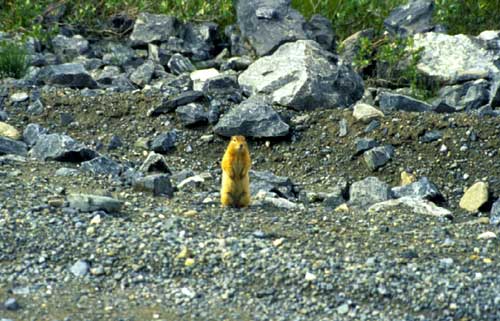 By HANNAH GUILLAUME Scripps Howard Foundation Wire November 03, 2006
Tests show that during hibernation ground squirrels are able to resist brain damage and injuries related to loss of blood flow and oxygen to the brain. Scientists said they think this is partly because squirrels' body temperatures can go below freezing without causing damage - a rare feat for a mammal.  SHNS Photo by Kelly Drew / The Institute of Arctic Biology at the University of Alaska Fairbanks
Drew said it's possible that a pill or an injection could allow the human body to mimic what ground squirrels do during hibernation. Induced hibernation might mean injured soldiers or people without access to medical treatment could survive with fewer long-term injuries, Drew said. Doctors sometimes use drug-induced comas in patients with brain injuries. Hibernation differs from coma because it is not caused by brain malfunction or disease. Drew's research has won $2.4 million in funding, some of it from the Defense Department. "One of the challenges with this work is that it is very new. We're still on the exploratory side of it," Drew said. She hopes to focus on therapeutic targets next year and eventually begin clinical trials. She said it has been confirmed repeatedly that cooling the temperature of an animal or human protects the brain. Now Drew is trying to figure out how hibernation works.
She said squirrels' rate of blood flow goes down to a dramatic 10 percent of normal on average, which resembles stroke conditions. "If we want to make some sort of impact with our work, stroke is where we want to research," Drew said. She added that stroke damage can sometimes progress for days. "If somebody has a stroke, usually they are paralyzed on one side - they can't talk." For soldiers, the resulting difference could mean coming out of induced hibernation after major trauma and not being paralyzed. Brian Barnes, director of the Institute of Arctic Biology, said it could take 10 years to understand how ground squirrels resist brain damage during hibernation and possibly 10 more years for clinical tests on humans. "But both time frames are speculative," Barnes said. Applying squirrels' on-and-off cycles of six to eight months hibernating in nests to humans could also allow astronauts to spend extended periods in space or stop cancer cell growth, Barnes said. Drew agreed and said someone who has the time and money to figure it out is what cancer research needs. "And nobody is working on that right now," Drew said. David McMullen, a visiting post-doctoral fellow at the National Institute of Neurological Disorder and Stroke in Maryland who is also studying squirrel hibernation, agreed that studies could affect cancer research. He hesitated about when an understanding of hibernation might produce tangible results. "If you think I'm going to tell you that we're going to come out with a pill that's going to prevent you from having a stroke, you're wrong," McMullen said. "I'm not going to do that. It's really hard to put a time frame on it."
On the Net:
Scripps Howard News Service, http://www.shns.com Publish A Letter on SitNews Read Letters/Opinions
|
|||